Myers-Brigg Saiyuki Post - SJ (3/15)
.
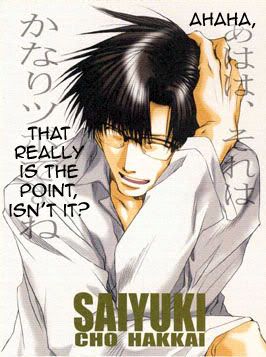
.
.
.........Like the Sensation-Perceivers (SP), people of the Sensation-Judging temperament make up roughly 38% of the population. The SJ longs for a sense of duty, and it follows that this type “exist primarily to be useful to the social units they belong to.” For these reasons, SJs are known for their dependability, stability, and reliability. These individuals feel they have to ‘belong,’ and this belonging must be earned.
.
........Of the guys in the ikkou, Hakkai is certainly the one most concerned for everyone's mutual welfare. He is always ready to heal wounds, patiently explain things to Goku, chastise Gojyo for his domestic sloppiness, or see that Sanzo doesn't succeed in pushing everyone away for good when he goes into one of his moods.
.
........The fact that Hakkai has managed to cultivate his own qi (a feat which his remarks to Goku in the first volume of the manga suggest any demon can accomplish, but not without plenty of effort and discipline) and
....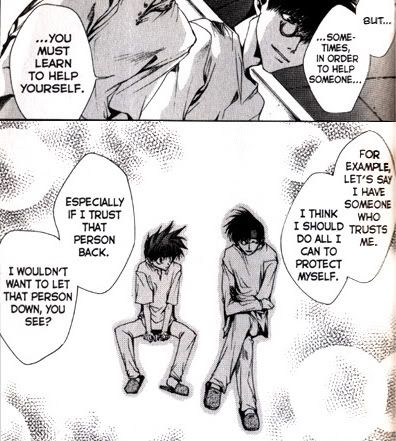
use it to heal others, at an obvious personal cost, says a lot about Hakkai's character and his willingness, even eagerness, to help others.
.
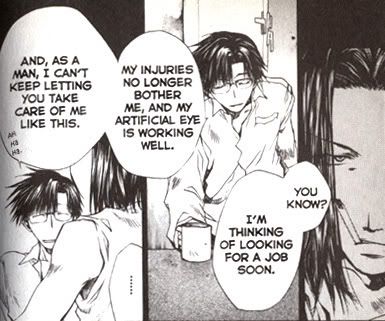
....
.
........Dependency is not a legitimate condition for the SJ, nor wanted. If it happens that he does become dependent, the SJ feels guilty, as if he has failed in his duty and obligations. He must be the giver or caretaker in any situation and not the taker or cared-for.
.
........The rare occasions on which Hakkai does need to accept being the cared-for don't seem to sit well with him at all. Early on in their relationship, Hakkai feels he must repay Gojyo's awkward hospitality by taking care of things at home. Likewise, he feels it necessary to make amends for the trouble he has put Sanzo through in hunting him down, and in continuing to vouch for him in his new life as 'Hakkai,' by tutoring Goku free of charge.
.
........During the journey to India, as well, we see time and again that Hakkai will push himself beyond his limits, rather than allow himself to possibly become a burden on his friends.
.
.
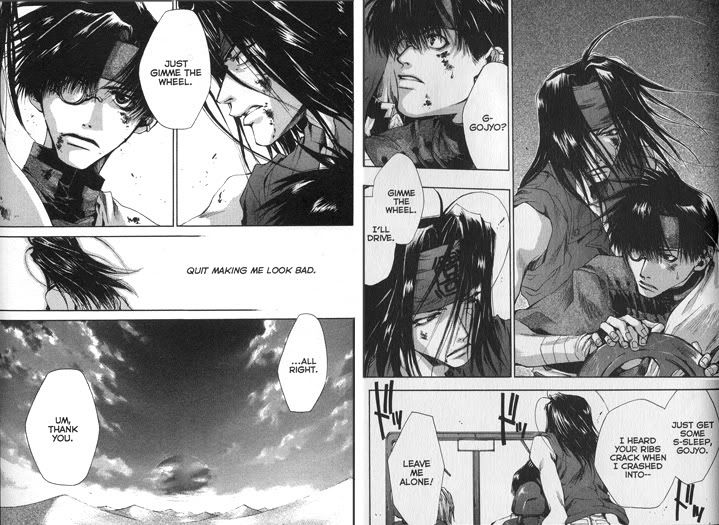
.
.
........In opposition to the SP’s compulsion to be free and independent, the SJ feels the need to be bound and obligated. The paternal, responsible SJ sanctions these urges with a belief in and desire for hierarchy. For him, hierarchy is the essence of society, with subordinance, superordinance, and rules which govern all interactions. Also tied into this concept are the principles of title and entitlement. An SJ respects the idea that some people are entitled to things that others are not, and that with particular titles come a measure of authority over others. While other types might feel this is unfair or untrue, an SJ is not bothered by this idea, and holds it as fact. What title an SJ feels he has in life, and what he feels he is entitled to, can shape his interactions with others.
........As far as Hakkai appears to be concerned, Sanzo occupies the top level of their own group hierarchy; Hakkai himself--whether by level-headedness, maturity, or merely the fact that Sanzo has the least need to deal swift paper-fan justice in his direction--constitutes the next lower level, while Goku and Gojyo, the ‘wayward children,’ are at the bottom of the totem pole.
.
........Of course, status in the social unit must be earned by doing one's part, and the SJ has a strong work ethic. Hakkai has never shown himself to be a slacker in any respect of the word, nor one to take the easy way out of a situation. When Sanzo leaves the ikkou to go looking for Ukoku, Hakkai is quick to take over as temporary leader of their group. Hakkai takes it upon himself to make sure the remaining three of them stay on track as much as possible, and do what needs to be done to enable them to continue westward.
....
.
........At the same time, there is an underlying pessimism to all the SJ’s deeds, in comparison to the SP’s easygoing optimism. Those of the SJ temperament believe in being prepared for everything, including any of the setbacks and unfortunate events which will inevitably occur. These individuals don’t predict disaster at every turn, but they are realistic about error and shortages, with the philosophy that it is “best to set aside something for rainy days.”
.

.
.
........Keirsey and Bates describe the SP and SJ temperaments as complements, and bring up Aesop’s fable of the ant and the grasshopper as a classic example of the reciprocity of this relationship: Ant encourages Grasshopper to get off his ass and help him stock up for the coming winter; Grasshopper counters that Ant should take it easy and relax with him, enjoying summer while it lasts. So of course winter comes and Grasshopper is SOL, while Ant is snug and well-provisioned. Grasshopper comes knocking on Ant’s door, and naturally, Ant lets him in because he loves Grasshopper too much to leave him at the mercy of his own poor life-choices. As K&B point out, “And so it is with SJs and SPs--they marry each other with high frequency and play out this eternal drama.”
.

.
.

....
.
.
.
.
........The SJ’s desire to be useful often comes in the form of a “membership hunger” to belong to as many social units as possible. More than any other style, he creates and fosters the continuity of the social unit (family, church, service clubs, the corporation, etc.), and these units can become an end in themselves for the SJ. Tradition, as well, becomes more and more important to him as he ages. If traditional ceremonies and celebrations don’t exist, the SJ soon establishes and maintains them.
.
........Hakkai, aptly enough, seems to almost genuinely take pleasure in the monotonous routine/pseudo-tradition they’ve settled into: the four of them riding in Jeep day after day, of the familiar back-seat squabbling, and Sanzo’s inevitable loss of patience and death threats.
.
.
........“Still, the SJ has a keen sense for detecting ingratitude and lack of appreciation, dealing as he does in giving, service, and care. Strangely though, he cannot ask for gratitude or appreciation because it is his duty to give, serve, and care for. He feels obligated, responsible, and burdened--and wants to feel that way. To feel otherwise is to be useless and not belong. To receive, be served, and be taken care of are not legitimate desires and must be expunged and hidden from oneself whenever they appear.”
.
........Of course, while Hakkai may not come right out and call any of the others on their ingratitude for all that he does, he's not above pulling a ruthless guilt-trip or two. ',:)
....
.
........An SJ tends to chose service-type occupations: teaching, banking, clerking, rehabilitating, managing. He is the “conservator” who always saves (as opposed to the SP, who continually spends in one way or another). This conservation can be seen in most of the SJ’s actions and attitudes, and he will often be incapable of refusing added responsibility with the thought, “If I don’t do it, who will?”
........Individuals with this temperament may feel some bitterness over this lack of appreciation. Keirsey and Bates write: “But this feeling of not being appreciated is not something the SJ can express freely, since he is after all indebted and obligated by his very nature. In a sense, just as he cannot store enough reserves for future contingencies, so he cannot take on enough duty and obligation to discharge his sense of indebtedness.”
.

.
.

....
........This is the type of person who takes it upon himself to learn the lessons of history for society. He sees hierarchy (read: inequality) as the only way to freedom; the SJ understands intuitively that as freedom increases, equality decreases, and as equality increases, freedom decreases. This sanctioning of hierarchy can be seen in the SJ’s reverence for elders and those in a position of authority, and his belief that they should be respected and deferred to.
.
........It’s true enough that Hakkai will nearly always seek Sanzo’s opinion before taking action, even if their best course of action is obvious. Likewise, whatever Sanzo decides, usually goes (even if it means Hakkai is leaving behind his best friend, possibly never to see him again).
.
........However, this doesn’t mean Hakkai is above ostensibly deferring to their group leader while secretly harboring subversive intent. Which he’ll wait until the appropriate moment to spring on Sanzo.
.
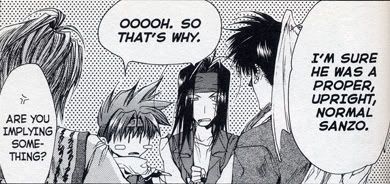
.
~
.

.
~
.

.
~
.
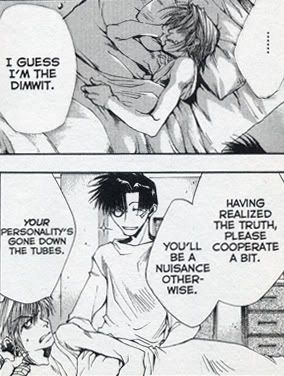
.
~
.
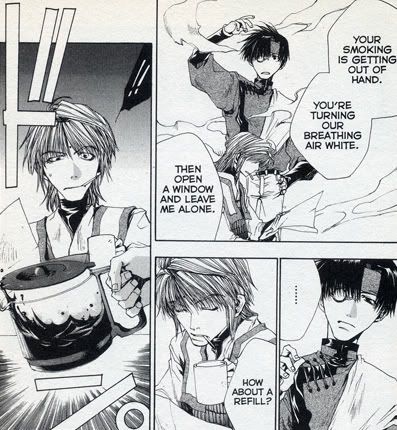
.
.
........Passive-aggressive much, Hakkai?
.
.
........There is no end to how much responsibility an SJ will accept. If there is any job to be done or duty to be fulfilled, he feels an obligation to see the end accomplished, even if he is already overburdened to the point of unreason, and even if others are contributing far less than their fair share. Not receiving sufficient appreciation for having done (or often gone far beyond) his duty can result in exhaustion, worry, or even ill, and the SJ is particularly vulnerable to depression.
........As it is, I'm not sure the rest of the ikkou realize how lucky they are to have an SJ like Hakkai around. Fighting skills and healing abilities aside, Hakkai is the one who makes it his job to ensure that the basic necessities of a life on the road are seen to. The other three men don't seem too inclined to care about laundry, their grocery supply, the happiness of their living and only mode of transportation, or cooking. Guys, you fail hard. D:
....
.
........Due to his strong air of responsibility and duty, the SJ has the tendency to take on a serious or forbidding appearance which does not do his warm heart justice. Stern attitude notwithstanding, this type of person has a special concern for the care of the young, elderly, and those in a position of authority.
.
.
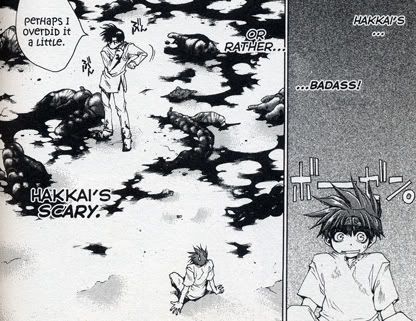
.
........The SJ has a deep commitment to the standards of society, and attempts to live up to these standards, as well as to instill them in the young. Someone of this temperament, likewise, does not like to be associated with people or institutions outside of established social boundaries. As mentioned above, a Sensation-Judging type will gravitate toward service occupations, including jobs in pharmacy, library science, nursing, and especially teaching, where he finds not only an opportunity for conservation, but a forum for his commitment to the transmission of the values of society to the next generation.
........Throughout the course of the manga, we see that Hakkai is clearly a man concerned with appearances, and with the standards (real or imagined) imposed upon him by society and others. It is a common fallback, especially early on in the series, for Hakkai to hide his true feelings behind a mask of insincere cheer or polite aloofness. Neither does Hakkai appreciate ‘unsavory’ types like Banri, nor those who would prefer to follow their own twisted moral code, such as Hazel.
.
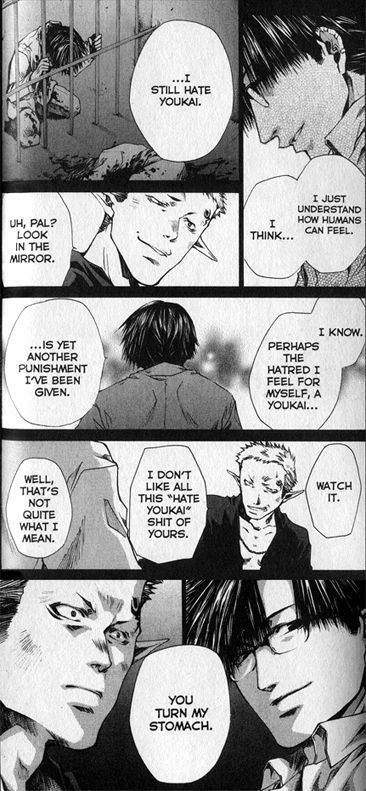
.
........But how does the image of Hakkai as one with a “deep commitment to the standards of society” mesh with the fact that he was having sex with his twin sister, and held a general apathy toward others, if not an outright contempt?
........As far as Xpyne and I know, the only instance in which Minekura attempts to explain what was going on in Gonou’s head during that time is in one of her Knockout Drops short stories. In it, Hakkai is talking aloud to Hakuryuu about Kanan, and the relationship they’d had. (cougarfang's translation of the story, posted to saiyuki back in 2006, can be found here.)
.
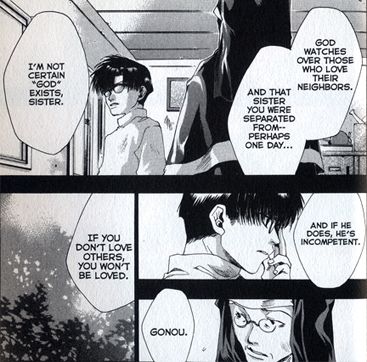
.....
.
.
........Hakkai’s personality as we know it now certainly doesn’t seem that of a man who would shun and condemn society, a man who would commit taboo transgressions such as incest and the vengeful murder of human villagers, or who would be unwilling to sacrifice a single person for the greater good. Consider, however, that Gonou was a child outcast from traditional society from the beginning, raised in an orphanage and allowed to cultivate his apathy in a climate of undeniable loneliness. Surely orphans raised among other orphans, more so than anyone else, have a realistic (even fatalistic) sense of how little belongs to them, and how little they themselves “belong.”
.
........It wasn’t until Gonou met Kanan that he was able to find this “belonging” (a powerful drive for SJs) for the first time. Hakkai admits that he felt he’d known this person “from before birth” the moment he met her, and this feeling of belonging only solidified when he discovered they were siblings. The knowledge that Kanan was his sister caused relief, not abhorrence, because their blood connection was something tangible on which he could stake his ties to her. Gonou felt he was incapable of loving anyone other than himself; if Kanan was an extension of himself, however, he could consider her to belong to him without shame or insecurity.
........Hakkai mentions to Hakuryuu that in hindsight, he realizes he and Kanan were in reality two completely separate beings, and that he now questions the worth of blood ties. Hakkai also admits that he had no knowledge of “what the love between family members actually was,” so it’s not hard to imagine Gonou, for as long as he could remember surrounded by strangers for which he held no depth of feeling, as incapable of distinguishing between ‘types’ of love.
........Ultimately, Hakkai’s love for Kanan was selfish, and in his own words, a love that was “not beautiful at all.” Gonou was a child who had never known anything but loneliness and isolation, who harbored a sense of himself as alone, pitted against the world and an incompetent God. Even finally finding his long-lost twin sister at fifteen only strengthened this attitude in him: instead of a singular self, now with his “other half,” Kanan, it was their collective self against the world and everyone else in it. Consequently, it was probably the fact that Gonou was able to hold onto this feeling of insularity which prevented him from growing up, emotionally. It is a child’s emotion, to feel downtrodden by the world simply for existing.
....
.

....
........In a way, Gojyo was the very first ‘other person’ Hakkai ever truly met. Sanzo and Goku followed not long after, and the realization that there were others out there with compassion and a sympathy of feeling was difficult for Hakkai to accept, initially. That Gojyo would save the life of a stranger and harbor a fugitive, that Sanzo would intercede on his behalf and deliver him from punishment for his crimes, that Goku would make himself a staunch ally for no other reason than deciding that he liked Hakkai...
........Hakkai, despite the slate of his life being wiped officially clean, knows he will never be fully integrated into society because he is a murderer, a hypocrite, a self-made monster. His newly-met companions, however, also exist on the fringes of 'proper' society: a half-breed bastard, a priest who smokes, swears, and kills, and a young man who is part god, part demon, sealed for 500 years for crimes he doesn’t remember. It is within this odd collection of outcasts that Hakkai is able to find a new sense of belonging, truer for the fact that none of their hands are unsoiled, and a belonging he will fight for.
.
........Through his association with these three men, Hakkai is able to break free of much of his self-loathing and become a bigger person. Whereas Gonou was cold and insular, as Hakkai he is finally able to focus his attention outside of himself and find a genuine desire to help his fellow man. Hakkai is willing to accept the
fact that he will never fit seamlessly into society--and perhaps doesn’t need to, any more so than Gojyo, Sanzo, or Goku--but this does not mean he won’t see to it that he and those around him do right by the established social order.
........The SJ is, after all, the “stabilizer of the social and economic world;” he has a well-developed sense of tradition and the ‘rights and wrongs’ of the culture, and takes a dim view of wrongdoers. Consequently, the SJ shows little mercy to those who transgress against social mores and institutions, unless one expresses regret and an intent to reform.
........Someone like Hazel, who presents himself as a holy man of utmost moral righteousness, yet makes a game out of life and death while keeping score by his own rules, would particularly rub an SJ the wrong way. With no apparent qualms about destroying human families with the false hope of normalcy, nor about killing children, youkai though they may be, it doesn't take Hazel long to earn himself Hakkai's contempt.
.
........(As a side note, ironically enough, Hazel also seems to be an SJ. Whether in desiring so desperately as a child to prove his worth and truly belong to Master Filbert’s clergy, wanting nothing more than to be useful to his Master, or in undertaking such an ambitious, far-reaching journey Eastward because he considers it his sacred duty to cleanse the earth of all youkai, Hazel is certainly driven by many of the same motivations that drive Hakkai. The significant difference, however, is in how each of these men views that hierarchy of social order which is so central to his interaction with others: while Hakkai’s hierarchy does not include ‘race’ in its calculations, Hazel’s does, and humans are quite clearly, emphatically, ranked above youkai. In the most recently released chapters of the manga, this militantly racist attitude seems to be wavering a bit in the face of continued acquaintance with the Sanzo-ikkou, and it will be interesting to see how this plays out in the future.)
....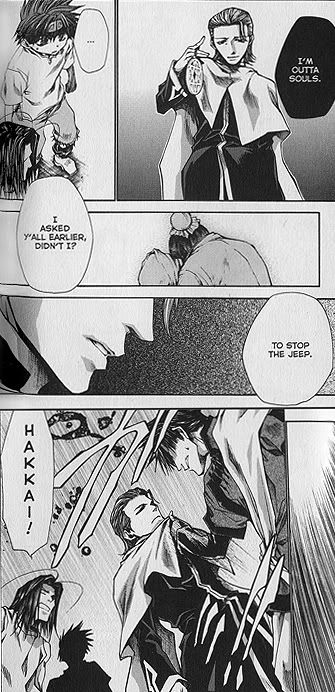
.
........Ultimately the SJ, more so than any other temperament type, can be counted on to do the right thing at the right time. For him, every day is a hunger for belonging, and a drive to contribute to the institutions which he serves. Each and every day the SJ “seeks to confirm that he does, indeed, belong,” and endeavors to prove this by continually taking up the responsibility of his duties. Having the attitude that “Not to do one’s duty is offensive; not to conform to the standards of society is in bad taste,” SJs of all varieties are known for their reliability and their dedication to the social units with which they choose to identify.
.
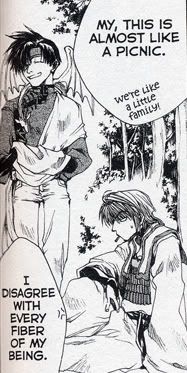
.
♪ Music: A Perfect Circle, "The Noose"
MBSPoD 1/15 - Intro
MBSPoD 2/15 - The SP (Gojyo)

.
.
.........Like the Sensation-Perceivers (SP), people of the Sensation-Judging temperament make up roughly 38% of the population. The SJ longs for a sense of duty, and it follows that this type “exist primarily to be useful to the social units they belong to.” For these reasons, SJs are known for their dependability, stability, and reliability. These individuals feel they have to ‘belong,’ and this belonging must be earned.
.
........Of the guys in the ikkou, Hakkai is certainly the one most concerned for everyone's mutual welfare. He is always ready to heal wounds, patiently explain things to Goku, chastise Gojyo for his domestic sloppiness, or see that Sanzo doesn't succeed in pushing everyone away for good when he goes into one of his moods.
.
........The fact that Hakkai has managed to cultivate his own qi (a feat which his remarks to Goku in the first volume of the manga suggest any demon can accomplish, but not without plenty of effort and discipline) and
....

use it to heal others, at an obvious personal cost, says a lot about Hakkai's character and his willingness, even eagerness, to help others.
.

....
.
........Dependency is not a legitimate condition for the SJ, nor wanted. If it happens that he does become dependent, the SJ feels guilty, as if he has failed in his duty and obligations. He must be the giver or caretaker in any situation and not the taker or cared-for.
.
........The rare occasions on which Hakkai does need to accept being the cared-for don't seem to sit well with him at all. Early on in their relationship, Hakkai feels he must repay Gojyo's awkward hospitality by taking care of things at home. Likewise, he feels it necessary to make amends for the trouble he has put Sanzo through in hunting him down, and in continuing to vouch for him in his new life as 'Hakkai,' by tutoring Goku free of charge.
.
........During the journey to India, as well, we see time and again that Hakkai will push himself beyond his limits, rather than allow himself to possibly become a burden on his friends.
.
.

.
.
........In opposition to the SP’s compulsion to be free and independent, the SJ feels the need to be bound and obligated. The paternal, responsible SJ sanctions these urges with a belief in and desire for hierarchy. For him, hierarchy is the essence of society, with subordinance, superordinance, and rules which govern all interactions. Also tied into this concept are the principles of title and entitlement. An SJ respects the idea that some people are entitled to things that others are not, and that with particular titles come a measure of authority over others. While other types might feel this is unfair or untrue, an SJ is not bothered by this idea, and holds it as fact. What title an SJ feels he has in life, and what he feels he is entitled to, can shape his interactions with others.
........As far as Hakkai appears to be concerned, Sanzo occupies the top level of their own group hierarchy; Hakkai himself--whether by level-headedness, maturity, or merely the fact that Sanzo has the least need to deal swift paper-fan justice in his direction--constitutes the next lower level, while Goku and Gojyo, the ‘wayward children,’ are at the bottom of the totem pole.
.
........Of course, status in the social unit must be earned by doing one's part, and the SJ has a strong work ethic. Hakkai has never shown himself to be a slacker in any respect of the word, nor one to take the easy way out of a situation. When Sanzo leaves the ikkou to go looking for Ukoku, Hakkai is quick to take over as temporary leader of their group. Hakkai takes it upon himself to make sure the remaining three of them stay on track as much as possible, and do what needs to be done to enable them to continue westward.
....

.
........At the same time, there is an underlying pessimism to all the SJ’s deeds, in comparison to the SP’s easygoing optimism. Those of the SJ temperament believe in being prepared for everything, including any of the setbacks and unfortunate events which will inevitably occur. These individuals don’t predict disaster at every turn, but they are realistic about error and shortages, with the philosophy that it is “best to set aside something for rainy days.”
.

.
.
........Keirsey and Bates describe the SP and SJ temperaments as complements, and bring up Aesop’s fable of the ant and the grasshopper as a classic example of the reciprocity of this relationship: Ant encourages Grasshopper to get off his ass and help him stock up for the coming winter; Grasshopper counters that Ant should take it easy and relax with him, enjoying summer while it lasts. So of course winter comes and Grasshopper is SOL, while Ant is snug and well-provisioned. Grasshopper comes knocking on Ant’s door, and naturally, Ant lets him in because he loves Grasshopper too much to leave him at the mercy of his own poor life-choices. As K&B point out, “And so it is with SJs and SPs--they marry each other with high frequency and play out this eternal drama.”
.

.
.

....
.
.
.
.
........The SJ’s desire to be useful often comes in the form of a “membership hunger” to belong to as many social units as possible. More than any other style, he creates and fosters the continuity of the social unit (family, church, service clubs, the corporation, etc.), and these units can become an end in themselves for the SJ. Tradition, as well, becomes more and more important to him as he ages. If traditional ceremonies and celebrations don’t exist, the SJ soon establishes and maintains them.
.
........Hakkai, aptly enough, seems to almost genuinely take pleasure in the monotonous routine/pseudo-tradition they’ve settled into: the four of them riding in Jeep day after day, of the familiar back-seat squabbling, and Sanzo’s inevitable loss of patience and death threats.
.
.
........“Still, the SJ has a keen sense for detecting ingratitude and lack of appreciation, dealing as he does in giving, service, and care. Strangely though, he cannot ask for gratitude or appreciation because it is his duty to give, serve, and care for. He feels obligated, responsible, and burdened--and wants to feel that way. To feel otherwise is to be useless and not belong. To receive, be served, and be taken care of are not legitimate desires and must be expunged and hidden from oneself whenever they appear.”
.
........Of course, while Hakkai may not come right out and call any of the others on their ingratitude for all that he does, he's not above pulling a ruthless guilt-trip or two. ',:)
....

.
........An SJ tends to chose service-type occupations: teaching, banking, clerking, rehabilitating, managing. He is the “conservator” who always saves (as opposed to the SP, who continually spends in one way or another). This conservation can be seen in most of the SJ’s actions and attitudes, and he will often be incapable of refusing added responsibility with the thought, “If I don’t do it, who will?”
........Individuals with this temperament may feel some bitterness over this lack of appreciation. Keirsey and Bates write: “But this feeling of not being appreciated is not something the SJ can express freely, since he is after all indebted and obligated by his very nature. In a sense, just as he cannot store enough reserves for future contingencies, so he cannot take on enough duty and obligation to discharge his sense of indebtedness.”
.

.
.

....
........This is the type of person who takes it upon himself to learn the lessons of history for society. He sees hierarchy (read: inequality) as the only way to freedom; the SJ understands intuitively that as freedom increases, equality decreases, and as equality increases, freedom decreases. This sanctioning of hierarchy can be seen in the SJ’s reverence for elders and those in a position of authority, and his belief that they should be respected and deferred to.
.
........It’s true enough that Hakkai will nearly always seek Sanzo’s opinion before taking action, even if their best course of action is obvious. Likewise, whatever Sanzo decides, usually goes (even if it means Hakkai is leaving behind his best friend, possibly never to see him again).
.
........However, this doesn’t mean Hakkai is above ostensibly deferring to their group leader while secretly harboring subversive intent. Which he’ll wait until the appropriate moment to spring on Sanzo.
.

.
~
.

.
~
.

.
~
.

.
~
.

.
.
........Passive-aggressive much, Hakkai?
.
.
........There is no end to how much responsibility an SJ will accept. If there is any job to be done or duty to be fulfilled, he feels an obligation to see the end accomplished, even if he is already overburdened to the point of unreason, and even if others are contributing far less than their fair share. Not receiving sufficient appreciation for having done (or often gone far beyond) his duty can result in exhaustion, worry, or even ill, and the SJ is particularly vulnerable to depression.
........As it is, I'm not sure the rest of the ikkou realize how lucky they are to have an SJ like Hakkai around. Fighting skills and healing abilities aside, Hakkai is the one who makes it his job to ensure that the basic necessities of a life on the road are seen to. The other three men don't seem too inclined to care about laundry, their grocery supply, the happiness of their living and only mode of transportation, or cooking. Guys, you fail hard. D:
....

.
........Due to his strong air of responsibility and duty, the SJ has the tendency to take on a serious or forbidding appearance which does not do his warm heart justice. Stern attitude notwithstanding, this type of person has a special concern for the care of the young, elderly, and those in a position of authority.
.
.

.
........The SJ has a deep commitment to the standards of society, and attempts to live up to these standards, as well as to instill them in the young. Someone of this temperament, likewise, does not like to be associated with people or institutions outside of established social boundaries. As mentioned above, a Sensation-Judging type will gravitate toward service occupations, including jobs in pharmacy, library science, nursing, and especially teaching, where he finds not only an opportunity for conservation, but a forum for his commitment to the transmission of the values of society to the next generation.
........Throughout the course of the manga, we see that Hakkai is clearly a man concerned with appearances, and with the standards (real or imagined) imposed upon him by society and others. It is a common fallback, especially early on in the series, for Hakkai to hide his true feelings behind a mask of insincere cheer or polite aloofness. Neither does Hakkai appreciate ‘unsavory’ types like Banri, nor those who would prefer to follow their own twisted moral code, such as Hazel.
.

.
........But how does the image of Hakkai as one with a “deep commitment to the standards of society” mesh with the fact that he was having sex with his twin sister, and held a general apathy toward others, if not an outright contempt?
........As far as Xpyne and I know, the only instance in which Minekura attempts to explain what was going on in Gonou’s head during that time is in one of her Knockout Drops short stories. In it, Hakkai is talking aloud to Hakuryuu about Kanan, and the relationship they’d had. (cougarfang's translation of the story, posted to saiyuki back in 2006, can be found here.)
.

.....
.
.
........Hakkai’s personality as we know it now certainly doesn’t seem that of a man who would shun and condemn society, a man who would commit taboo transgressions such as incest and the vengeful murder of human villagers, or who would be unwilling to sacrifice a single person for the greater good. Consider, however, that Gonou was a child outcast from traditional society from the beginning, raised in an orphanage and allowed to cultivate his apathy in a climate of undeniable loneliness. Surely orphans raised among other orphans, more so than anyone else, have a realistic (even fatalistic) sense of how little belongs to them, and how little they themselves “belong.”
.
........It wasn’t until Gonou met Kanan that he was able to find this “belonging” (a powerful drive for SJs) for the first time. Hakkai admits that he felt he’d known this person “from before birth” the moment he met her, and this feeling of belonging only solidified when he discovered they were siblings. The knowledge that Kanan was his sister caused relief, not abhorrence, because their blood connection was something tangible on which he could stake his ties to her. Gonou felt he was incapable of loving anyone other than himself; if Kanan was an extension of himself, however, he could consider her to belong to him without shame or insecurity.
........Hakkai mentions to Hakuryuu that in hindsight, he realizes he and Kanan were in reality two completely separate beings, and that he now questions the worth of blood ties. Hakkai also admits that he had no knowledge of “what the love between family members actually was,” so it’s not hard to imagine Gonou, for as long as he could remember surrounded by strangers for which he held no depth of feeling, as incapable of distinguishing between ‘types’ of love.
........Ultimately, Hakkai’s love for Kanan was selfish, and in his own words, a love that was “not beautiful at all.” Gonou was a child who had never known anything but loneliness and isolation, who harbored a sense of himself as alone, pitted against the world and an incompetent God. Even finally finding his long-lost twin sister at fifteen only strengthened this attitude in him: instead of a singular self, now with his “other half,” Kanan, it was their collective self against the world and everyone else in it. Consequently, it was probably the fact that Gonou was able to hold onto this feeling of insularity which prevented him from growing up, emotionally. It is a child’s emotion, to feel downtrodden by the world simply for existing.
....

.

....
........In a way, Gojyo was the very first ‘other person’ Hakkai ever truly met. Sanzo and Goku followed not long after, and the realization that there were others out there with compassion and a sympathy of feeling was difficult for Hakkai to accept, initially. That Gojyo would save the life of a stranger and harbor a fugitive, that Sanzo would intercede on his behalf and deliver him from punishment for his crimes, that Goku would make himself a staunch ally for no other reason than deciding that he liked Hakkai...
........Hakkai, despite the slate of his life being wiped officially clean, knows he will never be fully integrated into society because he is a murderer, a hypocrite, a self-made monster. His newly-met companions, however, also exist on the fringes of 'proper' society: a half-breed bastard, a priest who smokes, swears, and kills, and a young man who is part god, part demon, sealed for 500 years for crimes he doesn’t remember. It is within this odd collection of outcasts that Hakkai is able to find a new sense of belonging, truer for the fact that none of their hands are unsoiled, and a belonging he will fight for.
.
........Through his association with these three men, Hakkai is able to break free of much of his self-loathing and become a bigger person. Whereas Gonou was cold and insular, as Hakkai he is finally able to focus his attention outside of himself and find a genuine desire to help his fellow man. Hakkai is willing to accept the
fact that he will never fit seamlessly into society--and perhaps doesn’t need to, any more so than Gojyo, Sanzo, or Goku--but this does not mean he won’t see to it that he and those around him do right by the established social order.
........The SJ is, after all, the “stabilizer of the social and economic world;” he has a well-developed sense of tradition and the ‘rights and wrongs’ of the culture, and takes a dim view of wrongdoers. Consequently, the SJ shows little mercy to those who transgress against social mores and institutions, unless one expresses regret and an intent to reform.
........Someone like Hazel, who presents himself as a holy man of utmost moral righteousness, yet makes a game out of life and death while keeping score by his own rules, would particularly rub an SJ the wrong way. With no apparent qualms about destroying human families with the false hope of normalcy, nor about killing children, youkai though they may be, it doesn't take Hazel long to earn himself Hakkai's contempt.
.
........(As a side note, ironically enough, Hazel also seems to be an SJ. Whether in desiring so desperately as a child to prove his worth and truly belong to Master Filbert’s clergy, wanting nothing more than to be useful to his Master, or in undertaking such an ambitious, far-reaching journey Eastward because he considers it his sacred duty to cleanse the earth of all youkai, Hazel is certainly driven by many of the same motivations that drive Hakkai. The significant difference, however, is in how each of these men views that hierarchy of social order which is so central to his interaction with others: while Hakkai’s hierarchy does not include ‘race’ in its calculations, Hazel’s does, and humans are quite clearly, emphatically, ranked above youkai. In the most recently released chapters of the manga, this militantly racist attitude seems to be wavering a bit in the face of continued acquaintance with the Sanzo-ikkou, and it will be interesting to see how this plays out in the future.)
....

.
........Ultimately the SJ, more so than any other temperament type, can be counted on to do the right thing at the right time. For him, every day is a hunger for belonging, and a drive to contribute to the institutions which he serves. Each and every day the SJ “seeks to confirm that he does, indeed, belong,” and endeavors to prove this by continually taking up the responsibility of his duties. Having the attitude that “Not to do one’s duty is offensive; not to conform to the standards of society is in bad taste,” SJs of all varieties are known for their reliability and their dedication to the social units with which they choose to identify.
.

.
♪ Music: A Perfect Circle, "The Noose"
MBSPoD 1/15 - Intro
MBSPoD 2/15 - The SP (Gojyo)